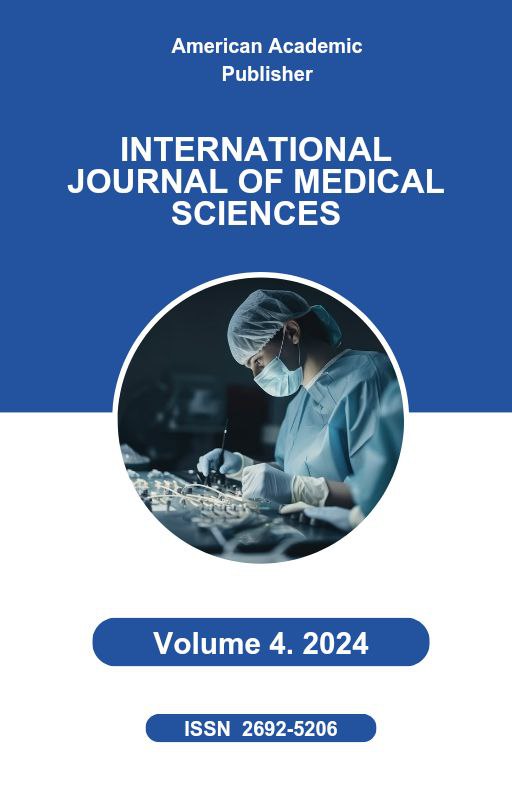 Articles
| Open Access |
https://doi.org/10.55640/
Articles
| Open Access |
https://doi.org/10.55640/
ATOPIC DERMATITIS AND THE INTERRELATIONSHIPS WITH GUT MICROBIOTA: MODERN PERSPECTIVES
Ayubova Muinakhon Javdatkhon kizi , Interdistrict Dermatovenereology Dispensary No. 4cAbstract
Atopic dermatitis (AD) is one of the most common chronic and recurrent inflammatory dermatoses affecting both children and adults worldwide. It is characterized by immune system imbalance, activation of cytokines such as IL-4, IL-13, and IL-31, as well as disruption of the epidermal barrier. In recent years, growing attention has been directed toward the potential interplay between atopic dermatitis and the gut microbiota. Numerous studies have shown that intestinal dysbiosis may alter the balance of T-cell subsets, modulate cytokine expression, and increase allergic sensitization. In particular, the reduction of beneficial bacteria such as Bifidobacterium and Lactobacillus has been associated with a more severe course of atopic dermatitis. Epidemiological investigations confirm that the gut microbiota composition of patients with AD differs significantly from that of healthy individuals.
Keywords
Atopic dermatitis; gut microbiota; immune system; cytokines; probiotics; prebiotics; dysbiosis.
References
Nutten S. Atopic dermatitis: global epidemiology and risk factors. Ann Nutr Metab. 2015;66 Suppl 1:8–16.
Kim J, Kim BE, Leung DYM. Pathophysiology of atopic dermatitis: current concepts and future directions. Allergy Asthma Proc. 2019;40(2):84–92.
Lee SY, Lee E, Park YM, Hong SJ. Microbiome in the gut–skin axis in atopic dermatitis. Allergy Asthma Immunol Res. 2018;10(4):354–62.
Paller AS, Kong HH, et al. The microbiome in patients with atopic dermatitis. J Allergy Clin Immunol. 2019;143(1):26–35.
Huang YJ, Marsland BJ, Bunyavanich S, et al. The microbiome in allergic disease: current understanding and future opportunities. J Allergy Clin Immunol. 2017;139(1):48–58.
Navarro-López V, et al. Effect of oral administration of a mixture of probiotic strains on SCORAD index in atopic dermatitis: a randomized trial. Nutrients. 2018;10(10):1489.
Osborn DA, Sinn JK. Probiotics in infants for prevention of allergic disease: systematic review. BMJ. 2007;335(7629):815.
De Benedetto A, Kubo A, Beck LA. Skin barrier disruption: a requirement for atopic dermatitis pathogenesis. J Invest Dermatol. 2012;132(3 Pt 1):756–63.
Flohr C, Mann J. New insights into the epidemiology of atopic dermatitis. Clin Exp Dermatol. 2014;39(3):257–61.
Wang Y, et al. Mapping the relationship between atopic dermatitis and gut microbiota: a bibliometric analysis. Front Microbiol. 2024;15:1400657.
Chan CWH, et al. Effects of gut microbiome and environment on the development of eczema in infants: a cohort study. Medicine (Baltimore). 2020;99(21):e20111.
Liu Y, et al. Atopic dermatitis and gut microbiota in children: a scoping review. BMC Pediatr. 2022;22:3390.
Reddel S, et al. Gut microbiota and atopic dermatitis in children: comparative analysis. Sci Rep. 2019;9:12334.
Adlerberth I, et al. Gut microbiota colonization patterns and eczema development in children. J Allergy Clin Immunol. 2007;119(4):817–23.
Tang H, et al. Gut microbiota modulation in atopic dermatitis: current evidence and perspectives. World J Clin Cases. 2025;13(2):112–25.
Article Statistics
Downloads
Copyright License

This work is licensed under a Creative Commons Attribution 4.0 International License.

